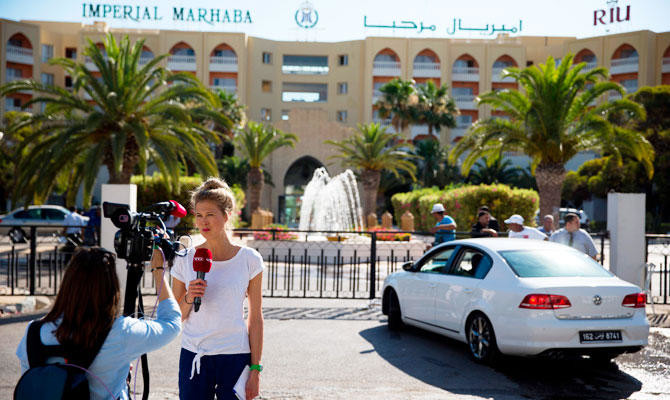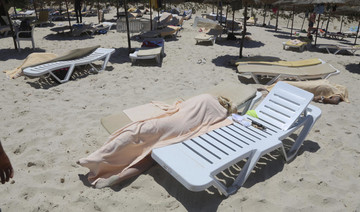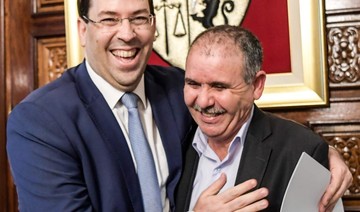TUNIS: A Tunisian court has sentenced seven extremists to life in prison over attacks at a museum and on a beach in 2015 that killed 60 people, many of them British tourists, prosecutors said on Saturday.
Dozens of defendants faced two separate trials over the closely linked shootings, which occurred just months apart in Tunis and Sousse, but many were acquitted.
Four were sentenced to life in prison for the shooting rampage at a Sousse tourist resort in June 2015, which killed 38 people, mostly British tourists.
Five other defendants in the Sousse case were handed jail terms ranging from six months to six years, while 17 were acquitted, prosecution spokesman Sofiene Sliti said.
Three were given life sentences for the earlier attack in March 2015 at the capital’s Bardo National Museum, in which two gunmen killed 21 foreign tourists and a Tunisian security guard.
Others found guilty of links to the Bardo attack were sentenced to prison terms ranging from one to 16 years, and a dozen defendants were acquitted, Sliti said.
The prosecution will appeal, he added.
One of the lawyers for relatives of French victims in the Bardo attack, Gerard Chemla, expressed “enormous bitterness” that the families had not been given more input into the proceedings.
He said a live feed of Friday’s hearing had brought some degree of comfort but lamented that the relatives of those killed had not been compensated.
Geraldine Berger-Stenger, another of the lawyers, said the hearings had not revealed the full truth of what took place.
“A page has turned, but this isn’t a trial that can satisfy the victims,” she said. “There is a taste of unfinished business.”
Tunisia retains the death penalty for terrorism offenses despite carrying out no executions since the 1990s.
The court heard that the two attacks, both claimed by Daesh, were closely linked.
Several defendants pointed to the fugitive Chamseddine Sandi as mastermind of both.
According to Tunisian media, Sandi was killed in a US air strike in neighboring Libya in February 2016, although there has been no confirmation.
Among those who were facing trial were six security personnel accused of failing to provide assistance to people in danger during the Sousse attack.
That shooting was carried out by Seifeddine Rezgui, who opened fire on a beach before rampaging into a high-end hotel, where he continued to fire a kalashnikov and throw grenades until being shot dead by police.
Four French nationals, four Italians, three Japanese and two Spaniards were among those killed in the Bardo attack, before the two gunmen, armed with Kalashnikov assault rifles, were themselves shot dead.
Investigations showed one of the gunmen, Yassine Laabidi — who was born in 1990 and was from a poor district near Tunis — had amphetamines in his body.
His fellow attacker Jaber Khachnaoui, born in 1994 and from Tunisia’s deprived Kasserine region, had traveled to Syria in December 2014 via Libya.
One suspect questioned in court, Tunis laborer Mahmoud Kechouri, said he had helped plan the Bardo attack, including preparing mobile phones for Sandi, a neighbor and longtime friend.
Kechouri, 33, said he was driven by a “duty to participate in the emergence of the caliphate,” that Daesh supremo Abu Bakr Al-Baghdadi proclaimed in June 2014 across swathes of territory the militants controlled in Iraq and neighboring Syria.
Other defendants accused of helping prepare the attack said they had only discussed ideas with friends. Several alleged they were tortured in detention.
Survivors and relatives in France and Belgium, who watched the live feed of Friday’s hearing, said it had helped them to turn the page.
“It was important for us to see, and especially to hear — to try to understand the role” of each defendant, said one French survivor.
“Arriving at the end of the process will help us to turn the page, even if we can never forget.”
The Sousse attack, which killed 30 Britons, is also the subject of proceedings in front of the Royal Courts of Justice in London, which is seeking to establish what happened.
After holding inquests into the British deaths in January and February 2017, judge Nicholas Loraine-Smith concluded that the response of Tunisian police was “at best shambolic, at worst cowardly.”
There have been significant improvements in security at Tunisian tourist resorts since the massacre and, in July 2017, Britain lifted its warning against “all but essential travel” to the North African country.
The attacks and resulting travel warnings dealt a devastating blow to Tunisia’s vital tourism sector from which it has taken time to recover.
Since a 2011 uprising that toppled dictator Zine El Abidine Ben Ali, militant attacks in Tunisia have killed dozens of members of the security forces.
Thousands of Tunisians have also traveled abroad to join extremist organizations, according to the United Nations.
Tunisian court sentences seven terrorists to life for deadly 2015 attacks
Tunisian court sentences seven terrorists to life for deadly 2015 attacks

- A Tunisian court has sentenced seven terrorists to life in prison over attacks at a museum and on a beach in 2015 that left dozens of tourists dead
- Two separate trials were held over the closely linked attacks which occurred just months apart in Tunis and Sousse
ICC prosecutor calls for end to intimidation of staff, statement says

In the statement posted on social media platform X, the ICC prosecutor’s office said all attempts to impede, intimidate or improperly influence its officials must cease immediately. It added that the Rome Statute, which outlines the ICC’s structure and areas of jurisdiction, prohibits these actions.
The statement, which named no specific cases, followed Israeli and American criticism of the ICC’s investigation into alleged war crimes committed during the Israel-Hamas conflict in the Gaza Strip, a Palestinian enclave.
Neither Israel nor its main ally the US are members of the court, and do not recognize its jurisdiction over the Palestinian territories. The court can prosecute individuals for alleged war crimes, crimes against humanity and genocide.
Last week Israel voiced concern that the ICC could be preparing to issue arrest warrants for government officials on charges related to the conduct of its war against Hamas in Gaza.
Foreign Minister Israel Katz said Israel expected the ICC to “refrain from issuing arrest warrants against senior Israeli political and security officials,” adding: “We will not bow our heads or be deterred and will continue to fight.”
On Friday, Israeli Prime Minister Benjamin Netanyahu said any ICC decisions would not affect Israel’s actions but would set a dangerous precedent.
In October, ICC Chief Prosecutor Karim Khan said it had jurisdiction over any potential war crimes committed by Hamas fighters in Israel and by Israeli forces in Gaza, which has been ruled by Hamas since 2007.
A White House spokesperson said on Monday the ICC had no jurisdiction “in this situation, and we do not support its investigation.”
Houthis offer education to students suspended in US protest crackdown

- Sanaa University applauded the “humanitarian” position of students in US campuses and said they could continue their studies in Yemen
SANAA: Yemen’s Iran-aligned Houthi militia, which has disrupted global shipping to display its support for Palestinians in the Gaza conflict, is now offering a place for students suspended from US universities after staging anti-Israeli protests.
Students have rallied or set up tents at dozens of campuses in the United States in recent days to protest against Israel’s war in Gaza, now in its seventh month.
Demonstrators have called on President Joe Biden, who has supported Israel’s right to defend itself, to do more to stop the bloodshed in Gaza and demanded schools divest from companies that support Israel’s government.
Many of the schools, including Ivy League Columbia University in New York City, have called in police to quell the protests.
“We are serious about welcoming students that have been suspended from US universities for supporting Palestinians,” an official at Sanaa University, which is run by the Houthis, told Reuters. “We are fighting this battle with Palestine in every way we can.”
Sanaa University had issued a statement applauding the “humanitarian” position of the students in the United States and said they could continue their studies in Yemen.
“The board of the university condemns what academics and students of US and European universities are being subjected to, suppression of freedom of expression,” the board of the university said in a statement, which included an email address for any students wanting to take up their offer.
The US and Britain returned the Houthi militia to a list of terrorist groups this year as their attacks on vessels in and around the Red Sea hurt global economies.
The Houthi’s offer of an education for US students sparked a wave of sarcasm by ordinary Yemenis on social media. One social media user posted a photograph of two Westerners chewing Yemen’s widely-used narcotic leaf Qat. He described the scene as American students during their fifth year at Sanaa University.
Israel confirms death of hostage held in Gaza

- Or was killed and his body held in Gaza since October 7
- His wife was killed in the initial attack while two of their three children were abducted
Jerusalem: An Israeli man held hostage in Gaza since the October 7 Hamas attack has been confirmed dead, the government and the kibbutz where he had lived said early Friday.
Dror Or, 49, is the latest hostage to have been confirmed dead by Israel after begin captured during the Hamas attack that triggered war with Israel.
Or was killed and his body held in Gaza since October 7, the Beeri kibbutz said. It was one of the communities hardest hit in the Hamas attack on southern Israel from the Gaza Strip.
His wife Yonat was killed in the initial attack while two of their three children, Noam and Alma, aged 17 and 13, were abducted and then freed in November as part of a ceasefire and hostages-for-prisoners swap deal between Israel and Hamas.
Israel estimates that 129 captives seized by militants during their attack remain in Gaza. The military says 35 of them are dead including Or.
“We are heartbroken to share that Dror Or, who was kidnapped by Hamas on October 7, had been confirmed as murdered and his body is being held in Gaza,” the Israeli government said on X.
The two children and their brother Yahli are now orphans, it added.
Campaign group the Hostages and Missing Families Forum said it will provide assistance to Or’s family.
The forum and Israeli government did not say how they learned of Or’s death.
“Only by securing the release of all hostages, the living for rehabilitation, the deceased for burial can our people’s revival and future be ensured,” the forum said in a statement.
“Israeli government must exhaust every effort to bring Dror and... the other murdered hostages back for honorable burials in Israel.”
Or’s death was announced as mediators Qatar, the United States and Egypt await Hamas’s response to a new Israeli proposal for a ceasefire and hostage release.
In late November during a week-long truce, 105 hostages were released including 80 Israelis and people from other countries in exchange for the release of 240 Palestinians held by Israel.
The war started with Hamas’s October 7 attack on Israel that resulted in the deaths of 1,170 people, mostly civilians, according to an AFP tally of Israeli official figures.
Israel’s retaliatory offensive against Hamas has killed at least 34,596 people in Gaza, mostly women and children, according to the Hamas-run territory’s health ministry.
Hamas sending delegation to Egypt for further ceasefire talks in latest sign of progress

- After months of stop-and-start negotiations, the ceasefire efforts appear to have reached a critical stage
- Question remains whether Israel will accept end to war without reaching its stated goal of destroying Hamas
BEIRUT: Hamas said Thursday that it was sending a delegation to Egypt for further ceasefire talks, in a new sign of progress in attempts by international mediators to hammer out an agreement between Israel and the militant group to end the war in Gaza.
After months of stop-and-start negotiations, the ceasefire efforts appear to have reached a critical stage, with Egyptian and American mediators reporting signs of compromise in recent days. But chances for the deal remain entangled with the key question of whether Israel will accept an end to the war without reaching its stated goal of destroying Hamas.
The stakes in the ceasefire negotiations were made clear in a new UN report that said if the Israel-Hamas war stops today, it will still take until 2040 to rebuild all the homes that have been destroyed by nearly seven months of Israeli bombardment and ground offensives in Gaza. It warned that the impact of the damage to the economy will set back development for generations and will only get worse with every month fighting continues.
The proposal that US and Egyptian mediators have put to Hamas -– apparently with Israel’s acceptance — sets out a three-stage process that would bring an immediate six-week ceasefire and partial release of Israeli hostages, but also negotiations over a “permanent calm” that includes some sort of Israeli withdrawal from Gaza, according to an Egyptian official. Hamas is seeking guarantees for a full Israeli withdrawal and complete end to the war.
Hamas officials have sent mixed signals about the proposal in recent days. But on Thursday, its supreme leader, Ismail Haniyeh, said in a statement that he had spoken to Egypt’s intelligence chief and “stressed the positive spirit of the movement in studying the ceasefire proposal.”
The statement said that Hamas negotiators would travel to Cairo “to complete the ongoing discussions with the aim of working forward for an agreement.” Haniyeh said he had also spoken to the prime minister of Qatar, another key mediator in the process.
The brokers are hopeful that the deal will bring an end to a conflict that has killed more than 34,000 Palestinians, according to local health officials, caused widespread destruction and plunged the territory into a humanitarian crisis. They also hope a deal will avert an Israeli attack on Rafah, where more than half of Gaza’s 2.3 million people have sought shelter after fleeing battle zones elsewhere in the territory.
If Israel does agree to end the war in return for a full hostage release, it would be a major turnaround. Since Hamas’ Oct. 7 attack stunned Israel, its leaders have vowed not to stop their bombardment and ground offensives until the militant group is destroyed. They also say Israel must keep a military presence in Gaza and security control after the war to ensure Hamas doesn’t rebuild.
Publicly at least, Israeli Prime Minister Benjamin Netanyahu continues to insist that is the only acceptable endgame.
He has vowed that even if a ceasefire is reached, Israel will eventually attack Rafah, which he says is Hamas’ last stronghold in Gaza. He repeated his determination to do so in talks Wednesday with US Secretary of State Antony Blinken, who was in Israel on a regional tour to push the deal through.
The agreement’s immediate fate hinges on whether Hamas will accept uncertainty over the final phases to bring the initial six-week pause in fighting — and at least postpone what it is feared would be a devastating assault on Rafah.
Egypt has been privately assuring Hamas that the deal will mean a total end to the war. But the Egyptian official said Hamas says the text’s language is too vague and wants it to specify a complete Israeli pullout from all of Gaza. The official spoke on condition of anonymity to talk about the internal deliberations.
On Wednesday evening, however, the news looked less positive as Osama Hamdan, a top Hamas official, expressed skepticism, saying the group’s initial position was “negative.” Speaking to Hezbollah’s Al-Manar TV, he said that talks were still ongoing but would stop if Israel invades Rafah.
Blinken hiked up pressure on Hamas to accept, saying Israel had made “very important” compromises.
“There’s no time for further haggling. The deal is there,” Blinken said Wednesday before leaving for the US
An Israeli airstrike, meanwhile, killed at least five people, including a child, in Deir Al-Balah in central Gaza. The bodies were seen and counted by Associated Press journalists at a hospital.
The war broke out on Oct. 7. when Hamas militants broke into southern Israel and killed over 1,200 people, mostly Israelis, taking around 250 others hostage, some released during a ceasefire on November.
The Israel-Hamas war was sparked by the Oct. 7 raid into southern Israel in which militants killed around 1,200 people, mostly civilians, and abducted around 250 hostages. Hamas is believed to still hold around 100 hostages and the remains of more than 30 others.
Since then, Israel’s campaign in Gaza has wreaked vast destruction and brought a humanitarian disaster, with several hundred thousand Palestinians in northern Gaza facing imminent famine, according to the UN More than 80 percent of the population has been driven from their homes.
The “productive basis of the economy has been destroyed” and poverty is rising sharply among Palestinians, according to the report released Thursday by the United Nations Development Program and the Economic and Social Commission for Western Asia.
It said that in 2024, the entire Palestinian economy — including both Gaza and the West Bank -– has so far contracted 25.8 percent. If the war continues, the loss will reach a “staggering” 29 percent by July, it said. The West Bank economy has been hit by Israel’s decision to cancel the work permits for tens of thousands of laborers who depended on jobs inside Israel.
“These new figures warn that the suffering in Gaza will not end when the war does,” UNDP administrator Achim Steiner said. He warned of a “serious development crisis that jeopardizes the future of generations to come.”
Israel builds ‘cyber dome’ against Iran’s hackers

- Israeli cybersecurity agency had thwarted around 800 significant attacks since the Oct. 7 Gaza war erupted
- But some attacks could not be foiled, including against hospitals in which patient data was stolen
TEL AVIV: Israel’s Iron Dome defense system has long shielded it from incoming rockets. Now it is building a “cyber dome” to defend against online attacks, especially from arch foe Iran.
“It is a silent war, one which is not visible,” said Aviram Atzaba, the Israeli National Cyber Directorate’s head of international cooperation.
While Israel has fought Hamas in Gaza since the October 7 attack, it has also faced a significant increase in cyberattacks from Iran and its allies, Atzaba said.
“They are trying to hack everything they can,” he told AFP, pointing to Hamas and Lebanon’s Hezbollah movement but adding that so far “they have not succeeded in causing any real damage.”
He said around 800 significant attacks had been thwarted since the war erupted. Among the targets were government organizations, the military and civil infrastructure.
Some attacks could not be foiled, including against hospitals in the cities of Haifa and Safed in which patient data was stolen.
While Israel already has cyber defenses, they long consisted of “local efforts that were not connected,” Atzaba said.
So, for the past two years, the directorate has been working to build a centralized, real-time system that works proactively to protect all of Israeli cyberspace.
Based in Tel Aviv, the directorate works under the authority of the prime minister. It does not reveal figures on its staff, budget or computing resources.
Israel collaborates closely with multiple allies, including the United States, said Atzaba, because “all states face cyber terrorism.”
“It takes a network to fight a network,” he said.
Israel’s arch foe Iran is “an impressive enemy” in the online wars, said Chuck Freilich, a researcher at the Institute for National Security Studies, which is affiliated with Tel Aviv University.
“Its attacks aim to sabotage and destroy infrastructure, but also to collect data for intelligence and spread false information for propaganda purposes,” he said.
Iran has welcomed Hamas’s October 7 attack on Israel, which resulted in the deaths of 1,170 people, mostly civilians, according to an AFP tally based on Israeli official figures.
Israel’s retaliatory offensive against Hamas has killed at least 34,596 people in Gaza, mostly women and children, according to the Hamas-run territory’s health ministry.
Regional tensions have soared, particularly after Iran for the first time fired hundreds of missiles directly at Israel last month in retaliation for a deadly Israeli air strike on the Iranian consulate in Damascus.
It was the most dramatic escalation yet after a years-long shadow war of killings and sabotage attacks between Israel and Iran.
Freilich argued in a study published in February that Iran was relatively slow to invest in cyberwarfare, until two key events triggered a change.
First, its leaders took note of how anti-government protesters used the Internet as a tool to mobilize support for a 2009 post-election uprising.
In the bloody crackdown that crushed the movement, Iran’s authorities cut access to social media and websites covering the protests.
Then, in September 2010, a sophisticated cyberattack using the Stuxnet virus, blamed by Iran on Israel and the United States, caused physical damage to Tehran’s nuclear program.
Freilich said the attack “demonstrated Iran’s extreme vulnerability and led to a severe national shock.”
Since then, Iran has gained substantial expertise to become “one of the most active countries in cyberspace,” he said
While Israel is considered a major cyber power, Iran was only likely to improve, said Freilich.
He pointed to assistance from Russia and China, as well as its much larger population and an emphasis on cyber training for students and soldiers alike, adding that the trend was “concerning for the future.”
Atzaba insisted that the quantity of hackers is secondary to the quality of technology and the use it is put to.
“For the past two years, we have been developing a cyber dome against cyberattacks, which functions like the Iron Dome against rockets,” he said.
“With cyber dome, all sources are fed into a large data pool that enables a view of the big picture and to invoke a national response in a comprehensive and coordinated manner.”
The Israeli system has various scanners that continuously “monitor Israeli cyberspace for vulnerabilities and informs the stakeholders of the means to mitigate them,” he said.
Israel’s cyber strength relied on close cooperation between the public, private and academic sectors, as well as Israel’s “white hat” hackers who help identify weaknesses.
“We work hand in hand,” he said.

















